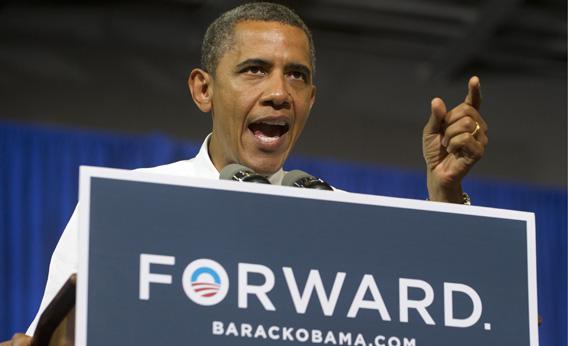President Obama reiterated Monday his opposition to Republican efforts to fully extend the Bush tax cuts beyond their scheduled expiration at the end of this year. Instead, Obama says he wants to extend most of the tax cuts for one year (2013) while allowing the top two tax brackets to revert to Clinton-era levels. His hope is that Congress will use 2013 to pass broad tax reform. Under Obama’s plan, households with taxable incomes above $250,000 will pay higher taxes, which the GOP is furious about, especially citing the dire impact on small business owners.
What’s striking about this whole debate is how the very business owners and politicians who seem certain that tax shifts will radically harm the economy are bizarrely uninformed about how the tax code actually works. In particular, they don’t appear to understand what marginal tax rates and tax brackets actually are.
The Republican majority on the House small business committee unveiled a small-businessopen mic site on Monday to reveal “what small business owners are saying about the president’s plan to raise taxes.” Some of what they’re saying is that they don’t know what they’re talking about.
Steve Piechota of Netronix Integration in San Jose, Calif., leads the list of complainers. He explains that his business has grown from 3 employees to 50 over the past five years and that the “growth has kept our income low, as we’ve invested back into the company in the form of additional jobs and equipment.” But thanks to tax hikes, he fears that the growth has come to an end. “Bottom line,” he warns, “raising our taxes means we’ll quit growing, lay off people and stay under the $250k level for income.” His concern is reminiscent of a (since-corrected) September 2011 USA Today piece warning people that the extra money that comes with a raise “is nice, but it could very well bump you into the next tax bracket, possibly leaving you with less money than you had before the raise.”
The good news for Piechota, in case he’s listening, is that this isn’t how tax brackets work. In the event that Obama wins the election, one can only hope Piechota will consult with an accountant or other professional before laying off workers and deliberately reducing his income. The way U.S. income tax brackets work is that taxes are levied on marginal income. In other words, the rate applied to income earned over the $250,000 threshold is irrelevant to the first $250,000 worth of taxable income. If you have $250,010 of taxable earnings then only that last $10 is taxed at the higher rate. In all cases, higher pre-tax earnings lead to higher after-tax income.
Similarly, a curiously large number of the small business owners surveyed by House Republicans don’t seem to understand the difference between profits and revenues. The issue here is that some (but not all) small firms are organized as what are called “pass-through entities” for tax purposes. The exception is what’s known as a C Corporation, typically a larger firm. A C corporation files a tax return as a freestanding entity and pays corporate income tax on its profits. If after-tax profits are distributed to shareholders as dividends or share buybacks, then the individuals who profit are taxed on their earnings according to the tax schedule for dividends or capital gains. A pass-through entity, by contrast, pays no taxes. Instead its profits are distributed to its owners (typically a small group of people) and they pay income—but not payroll—taxes on the proceeds.
So when Steve Woodall of Reliant Business Products says his “guess is that we would have to start looking for ways to outsource some of our jobs in order to keep the company solvent,” he’s missing the point. If his company isn’t profitable, he’ll have no income to pay taxes on at all. Dave Parry of MPS Techline of Pennsylvania says his company’s revenues go to “paying the 23 employees, buying the necessary raw materials, paying all of the overhead bills, and investing in new equipment.” Here, again, he’s missing the point that there’s no federal income tax levied on income that’s used to pay business expenses. Money that Parry spends on employee salaries, for example, isn’t his income—it’s his employees’ income—and they’ll pay taxes on it. Absolutely nothing about a tax increase would turn a previously profitable investment, new hire, or expansion into an unprofitable one.
That’s not to say there’s no potentially valid concern about the impact of personal income taxes on small businesses. The key issue is that any business owner needs to decide how much of his or her own personal time and effort to put into the business. Do you stay late burning the midnight oil or close up early to make sure to be able to have dinner with your kids?
Workers of all kinds face these kind of tradeoffs. But one major advantage of small-business ownership is that you get an unusually large amount of latitude in determining your own schedule. And here taxes are clearly relevant. Insofar as putting in more hours will earn you extra profits, how much of those extra profits you have to keep and how much goes to the government may weigh on your mind. The value to the country of being able to afford Social Security, Medicare, the military, and transportation infrastructure needs to be set against the value of harder work on the part of high-income individuals with flexible schedules.
But it’s worth keeping this in perspective. As even House Speaker John Boehner has been known to admit, only 3 percent of small firm proprietors would be affected by these higher taxes, precisely because what’s taxed is profits, not gross revenue. Relatively few people—whether they’re highly skilled professionals, managers of large firms, or owners of small businesses—are successful enough to have more than $250,000 in take-home pay. Those who do, however, derive political benefit from the evident confusion of more humble business owners.
